Westhoffen | |
|---|---|
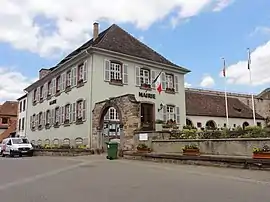 The town hall in Westhoffen | |
.svg.png.webp) Coat of arms | |
Location of Westhoffen | |
 Westhoffen 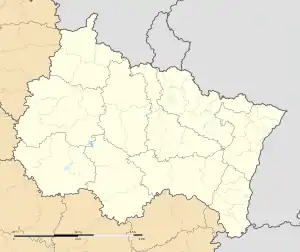 Westhoffen | |
| Coordinates: 48°36′N 7°26′E / 48.60°N 7.44°E | |
| Country | France |
| Region | Grand Est |
| Department | Bas-Rhin |
| Arrondissement | Molsheim |
| Canton | Saverne |
| Intercommunality | Mossig et Vignoble |
| Government | |
| • Mayor (2020–2026) | Pierre Geist[1] |
| Area 1 | 20.65 km2 (7.97 sq mi) |
| Population | 1,693 |
| • Density | 82/km2 (210/sq mi) |
| Time zone | UTC+01:00 (CET) |
| • Summer (DST) | UTC+02:00 (CEST) |
| INSEE/Postal code | 67525 /67310 |
| Elevation | 184–531 m (604–1,742 ft) |
| 1 French Land Register data, which excludes lakes, ponds, glaciers > 1 km2 (0.386 sq mi or 247 acres) and river estuaries. | |
Westhoffen (French pronunciation: [vɛstofən]; German: Westhofen im Elsass; Alsatian: Westhofe) is a commune in the Bas-Rhin department and Grand Est region of north-eastern France.[3]
History
From 1236 Westhofen was a fief of the Holy Roman Empire to the Lords of Lichtenberg, who with their successors Hanau-Lichtenberg will remain the lords of the places until the French Revolution. In the rule of Lichtenberg it was assigned to Amt Westhofen of the same name. In 1332 Westhofen received Town privileges, namely that of Haguenau.
The coat of arms of Westhoffen is thus directly inspired by the seal of the Lichtenbergs: a helm with a swan's neck crest. At this time (1250) the construction of the Saint-Martin church began, one of the rare hall churches of the Gothic period, which was profoundly altered and enlarged in the 19th century, thus giving it a neo-Gothic external appearance then in vogue.
When Jakobus ("James"), Count of Lichtenberg, the last male member of the family, died in 1480, the inheritance was divided between his two nieces, Anna and Elisabeth. Anna had married Philipp I, Count of Hanau-Lichtenberg (1417–1480), through whom Amt Westhofen came to the County of Hanau-Lichtenberg that resulted from this marriage.
Population
| Year | Pop. | ±% p.a. |
|---|---|---|
| 1968 | 1,348 | — |
| 1975 | 1,386 | +0.40% |
| 1982 | 1,416 | +0.31% |
| 1990 | 1,460 | +0.38% |
| 1999 | 1,590 | +0.95% |
| 2007 | 1,610 | +0.16% |
| 2012 | 1,669 | +0.72% |
| 2017 | 1,651 | −0.22% |
| Source: INSEE[4] | ||
Gallery
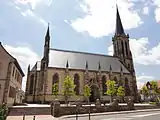 Protestant church
Protestant church
Saint-Martin.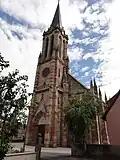 Protestant church
Protestant church
Saint-Martin.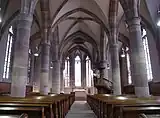 Interior view of the nave
Interior view of the nave
towards the choir.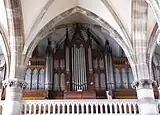 Dalstein-Haerpfer organ (1874-1912).
Dalstein-Haerpfer organ (1874-1912).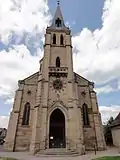 Catholic Church
Catholic Church
Saint-Martin..JPG.webp) Tannery Bury
Tannery Bury
See also
References
- ↑ "Répertoire national des élus: les maires". data.gouv.fr, Plateforme ouverte des données publiques françaises (in French). 2 December 2020.
- ↑ "Populations légales 2021". The National Institute of Statistics and Economic Studies. 28 December 2023.
- ↑ INSEE commune file
- ↑ Population en historique depuis 1968, INSEE